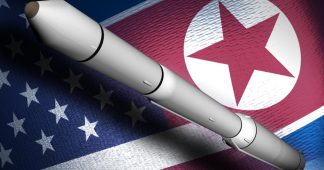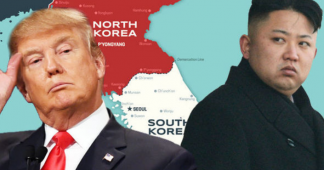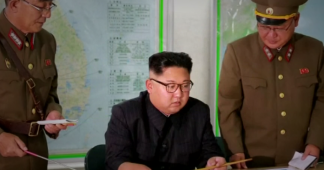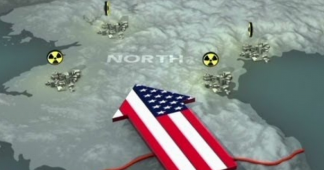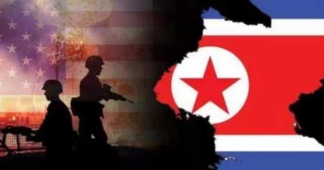By Peter Symonds
US Defence Secretary James Mattis warned North Korea yesterday that any attempt to fire missiles towards the American territory of Guam or the United States itself would be “game on”—in other words, war between the two countries.
His threat came as US President Trump signed an executive order initiating an investigation that could result in trade war measures against China. Trump officials have been increasingly critical of Beijing for failing to use crippling economic sanctions to force Pyongyang to abandon its nuclear and missile programs.
Mattis’s remarks followed bellicose threats by President Trump last week to engulf North Korea in “fire and fury like the world has never seen” if it continued to threaten the US. On Friday, Trump warned that the military option was now “locked and loaded should North Korea act unwisely.”
The Pyongyang regime responded by announcing that its military was drawing up plans to fire four intermediate-range missiles to plunge into the sea near Guam, home to US military bases that would be used in any war with North Korea. The state-owned media KCNA reported yesterday that North Korean leader Kim Jong-un had reviewed the plans and discussed the possibility of carrying out the “fire of power demonstration.”
Mattis warned that if North Korea shot at the United States, he would assume that its missiles would hit the US and “if they do that, then it’s game on.” He underscored the warning by declaring: “You don’t shoot at people in this world unless you want to bear the consequences.”
Mattis also made clear that the US would pre-emptively destroy any North Korean missiles shortly after they were fired. He said that the US military would be able to determine “within moments” after launch whether a missile was headed to any American territory, including Guam and would “take it out” if it was.
While saying that “war was up to the President, perhaps up to the Congress,” Mattis insisted that the “bottom line is we will defend the country from an attack, for us that’s war, that’s a wartime situation.” In other words, the firing of a North Korean missile that the Pentagon alleges could hit American territory could become the pretext for a massive US attack on the Pyongyang regime and war, without the green light of Trump or Congress.
Amid high tensions with North Korea, President Trump broke into his vacation yesterday to sign an executive memorandum directing the US Trade Representative Robert Lighthizer to determine whether to initiate an investigation of China’s alleged theft of US intellectual property.
In the course of last year’s presidential election campaign, Trump accused China of “raping” the US through its trade policies and threatened a series of trade war measures against Beijing. In office, however, Trump pulled back from imposing heavy tariffs of up to 45 percent or declaring China “a currency manipulator” in order to secure Beijing’s assistance in bullying North Korea into line.
Trump met with Chinese President Xi Jinping in April and toned down the trade threats in the expectation that China would force North Korea to denuclearise. US relations rapidly soured, however, after North Korea test fired two long-range ballistic missiles. Trump lashed out in a tweet: “Our foolish past leaders have allowed them [China] to make hundreds of billions of dollars a year in trade, yet they do NOTHING for us with North Korea, just talk.”
During yesterday’s signing, Trump warned that it was “a very big move” and vowed that it was “just the beginning” of a crackdown on alleged unfair trade practices around the world. Declaring that he was keeping his election promises, he declared: “We will defend our workers. And we will protect the innovations, creations and inventions that power our magnificent country.”
As well as putting pressure on China, Trump’s heavily-promoted announcement was also an attempt to arrest his plunging support in the opinion polls, including among lower-income voters, whose living standards have continued to deteriorate under his presidency. The trade war measures now being contemplated against China will do nothing to defend the jobs, wages and conditions of American workers.
What Trump and his trade advisers brand as “theft” is nothing more than Chinese investment rules that require foreign companies investing in the country to form joint ventures with Chinese partners and share intellectual property. Writing in the Financial Times, US Commerce Secretary Wilbur Ross accused China of attacking “American genius” as part of a “Made in China 2025” plan to be a world leader in technologies such as robotics, semi-conductors and autonomous vehicles.
While complaining about the Chinese rules, American corporations have entered into joint ventures to gain access to China’s large and growing markets. The degree to which US companies rely on the monopoly status provided “intellectual property” is underscored by a 2016 Department of Commerce report which estimated that intellectual property accounted for nearly 40 percent of the US economy in 2014.
US Trade Representative Robert Lighthizer firstly has to determine whether an inquiry is warranted and the investigation itself could take up to a year to complete. It could, however, open the door for a range of trade war penalties against China, including unilateral US measures under Section 301 of the Trade Act of 1974. Section 301 has been little used since the creation of the World Trade Organisation (WTO) in 1995.
Beijing has reacted angrily to Trump’s announcement. An editorial yesterday in the state-owned China Daily warned against “a rash decision,” saying that “instead of advancing the United States’ interests, politicising trade will only [exacerbate] the country’s economic woes, and poison the overall China-US relationship.” It linked the US move to Trump’s “increasing disappointment at what he deems as China’s failure to bring [North Korea] into line.”
An op-ed article by US Secretary of State Rex Tillerson and Defence Secretary Mattis in the Wall Street Journal on Sunday pointedly demanded that China do far more to use its influence over North Korea. “That will include rigorous enforcement of sanctions, leaving no North Korean source of revenue untouched. In particular, the US will continue to request Chinese and Russian commitments not to provide the regime with economic lifelines and to persuade it to abandon its dangerous path.”
Trump’s announcement of the first steps towards trade war measures against China makes clear that the “requests” will be backed by penalties. Moreover, it demonstrates that the US confrontation with North Korea is linked to a broader strategy to undermine and subordinate China in particular, which Washington regards as its chief obstacle to dominance in Asia and globally
Read also
US remains poised to attack North Korea
